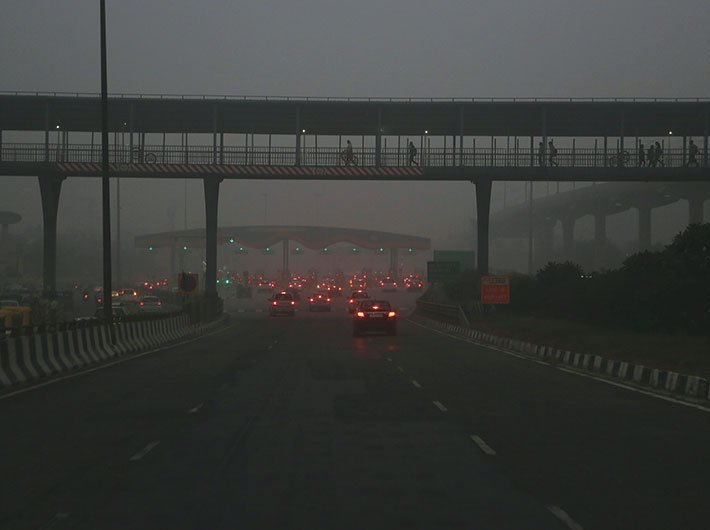When prime minister Narendra Modi, accompanied by his Japanese counterpart Shinzo Abe, was about to board his official plane to visit Varanasi about two years ago, he got a call from the then French president Francois Hollande. Hollande wanted to tell him about the progress in the ongoing Paris climate summit, known as COP 21. Modi said he would call him back after reaching Varanasi. Later, Modi called Hollande, heard the text of the draft, made suggestions and assured him of India’s full cooperation in climate protection. He also committed to go beyond the ‘Paris consensus’ to contribute more for the cause.
There are no reasons to doubt Modi’s commitment to environmental protection – he has also authored a book on climate change. But what seems to shatter all such tall talk to smithereens is the pall of poisonous toxins in a misty haze that surrounds Delhi. It has become difficult to breathe – not only outdoors, but even indoors. Those suffering from allergic asthma and other breathing problems have been facing the worst since the onset of winter.
The Delhi government not only asked the schools to remain shut but also advised parents against sending children outdoors. Nothing could be as worse an indictment of the society as an executive restraint to prevent children from going to schools and playing in the field. In fact, the grey smog that envelopes Delhi and neighbouring regions is an index of callousness and criminality in the country’s social and political order that is impermeable to people’s ordeal.
Though this annual phenomenon is blamed on the burning of the crop residue in Haryana and Punjab, the union government and the governments of Delhi and the adjoining states have always reacted in a kneejerk manner. And every time this poisonous climate continues for nearly a fortnight as the impotent rage of the citizen peters itself out into a “business as usual”.
Here comes the role of prime minister Narendra Modi who had promised that his government would not put up with the “chalta hai” approach of the past. But the air pollution in and around NCR is nothing but a reaffirmation of age-old adage: the more things change, the more they remain the same. At political and social level, the leadership maintains an ostrich-like approach to a danger that is imminent every year.
The ruling BJP is to be held accountable more than other parties. Though Punjab is now ruled by the Congress, Haryana, which contributes a great deal of pollutants in creating this haze, is ruled by the BJP. So is Uttar Pradesh. The least the BJP could have done was to sensitise the governments and launch a campaign at the social level to reduce pollutants before the onset of the winter. Perhaps these two states could have shown the way for Punjab and Delhi, which have reacted only after the crisis hit the people. Delhi chief minister Arvind Kejriwal and his Punjab counterpart Amarinder Singh have been using the issue to settle political scores, while others like UP CM Yogi Adityanath and Haryana CM Manohar Lal Khattar are simply ignoring it, as if wishing away a crisis is the best solution.
If one looks at a series of events and responses of the administration, it confirms the fear that the malaise that afflicted us in the past has rather taken a firm grip on governance. Take for instance the manner in which the UP government was found wanting in treating the mysterious vector-borne disease that killed thousands of children in Gorakhpur, the CM’s home district. Though the yogi, as MP from Gorakhpur, had raised this issue every year in parliament, he miserably failed as CM to mobilise the governance structure to nip the trouble in the bud. Obviously, the state bureaucracy has grown too thick-skinned and mired in deep corruption to listen to the cries of hoi polloi.
Of course, there is ample evidence to prove that the three and a half years of Modi’s regime have not succeeded in breaking the way the bureaucracy has been functioning. Though India won praise internationally for making a firm commitment to adhere to the Paris climate consensus, all these claims would sound hollow if one walks the streets of Delhi these days to encounter a crippling climate.
ajay@governancenow.com
This article appeared in FirstPost.com in a slightly different version.

